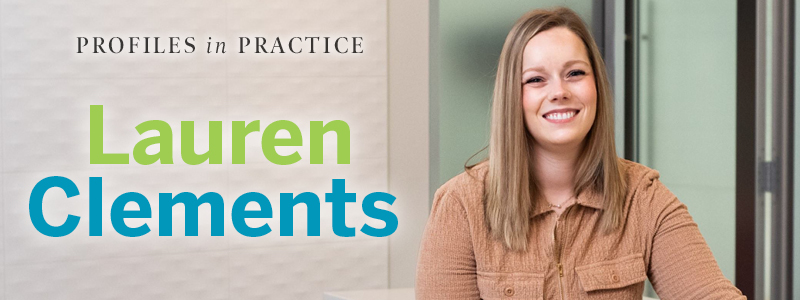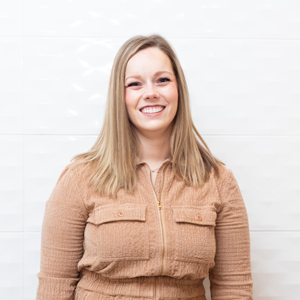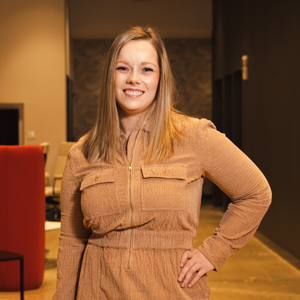
Sometimes it takes a while for lawyers to find their vocation. For Lauren Clements, it took some college-level biology courses, a memory from her grandmother, and a heart-to-heart conversation with a law school advisor. Clements, an associate at Littler Mendelson, is now an employment lawyer who loves her career. She’s also been a leading voice in advocacy for lawyers with disabilities here in Minnesota.
Growing up in South Dakota, Clements originally wanted to be a veterinarian. “I had wanted to be a vet since I was two years old. I loved animals. I grew up riding horses and had dogs,” she said. However, one semester into college, Clements realized that science wasn’t her strength., “I just kind of wanted my own dogs,” she remembers.
During college, Clements enjoyed taking business and government classes, but she was still unsure of what to do after graduation. After her advisor told her that she needed to pick a path, she settled on the law because she enjoyed the reading and writing aspect of it. She also received a sign from her grandmother: with her memory fading, Clements’ grandmother could only remember one detail about her granddaughter: she was going to law school. “So I thought, if that’s the one thing she could remember, I have to follow through on that,” Clements recalled.
still unsure of what to do after graduation. After her advisor told her that she needed to pick a path, she settled on the law because she enjoyed the reading and writing aspect of it. She also received a sign from her grandmother: with her memory fading, Clements’ grandmother could only remember one detail about her granddaughter: she was going to law school. “So I thought, if that’s the one thing she could remember, I have to follow through on that,” Clements recalled.
Clements thrived in law school at the University of St. Thomas. She especially enjoyed business law. However, a career as a transactional attorney didn’t feel like the right fit. A conversation with her advisor, Professor Neil Hamilton, helped her figure out her path. “You’re not driven by money. You’re not driven by billable hours. You need that passion piece. You need something where you’re really involved with people,” Hamilton told her.
She landed on employment law because it combined the business aspect of the law and working with people. “It all started to come together when I realized where that personal piece comes into play for my work,” she said.
“It all started to come together when I realized where that personal piece comes into play for my work.”
While Clements has settled into her career, she realized that she didn’t want to just be an attorney. Clements was born with a physical disability, Arthrogryposis.
In high school, she learned more about her condition, which led her to a national conference that she soon became deeply involved with. “I walked out of that conference a whole new person. It was so cool to see the power of being surrounded by people that have those similarities to you…that you can suddenly connect with people on what you haven't been able to connect with before,” she said.
However, when Clements got to law school, she pulled back on her advocacy., “I didn’t want my whole career to be about my disability,” she said. I live with it personally, and I didn’t want to live with it professionally as well.” She didn’t discuss her disability with her colleagues, and she turned down a job offer working in a disability law group for a local organization. However, an incident forced Clements to rethink how she thought about her disability.
Clements was heading to a summary judgement hearing, but there were no accessible parking spots at the courthouse, and she couldn’t get ahold of any courthouse staff to help, so she headed back to her office thinking she’d be facing consequences for missing the hearing.
To her shock, her supervisors and her colleagues advocated for Clements. She was taken aback. “What do you mean you want to support me? That's not something I'm used to,” she thought at the time. Slowly, she became more comfortable with bringing her disability into her professional life.
After meeting with another law school mentor, Professor Elizabeth Schlitz, who is now the associate dean for academic affairs at St. Thomas, told Clements that she had reached a point in her career where having a disability wouldn’t define her career. “You now gained more of the confidence of who you are,” she said. “And that now leaves space for you to do some of these other passion type projects without the fear that it’s going to define your entire career.”
Last year, along with Ann Motl of Greenberg Traurig, she helped launch the Minnesota Disability Bar Association, one of only a few bar associations of its kind in the country. The group provides education, advocacy, and support legal professionals and law students with disabilities.
Disability Bar Association, one of only a few bar associations of its kind in the country. The group provides education, advocacy, and support legal professionals and law students with disabilities.
While Clements’ career could have taken many different paths, she loves the route she’s taken. One grounding force in her life has been her mom. Being the first one in her family to graduate college and go to law school, her mom bought a book to help understand her law student daughter. “She was reading to understand and provide support.” Clements remembered. After reading, her mother came back to her with some questions: How are you going to help people? What are your goals? “It really kept me grounded through law school and then going through my career,” Clements recalled.
Recently, Clements helped launch Littler’s affinity group for individuals with disabilities, which helps empower and support employees who identify as having a disability. Last fall, she also attended an event hosted by her employer in Toronto for the firm’s affinity groups. “I was in a room with 20 to 25 people—shareholders, associates, counsel, and senior leadership—all discussing their disabilities,” she said. “Someone said, ‘I haven’t discussed my disability in a professional context in 20 years.’ That all made it worth it.”
By Nick Hansen
nhansen@mnbars.org
Nick Hansen is the communications manager of the Hennepin County Bar Association.